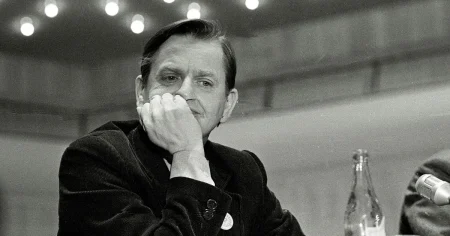Paragraph 1: The Swedish Social Democrats’ Nuclear Weapons Stance in Their Draft Party Program
The Swedish Social Democratic Party’s proposed new party program has sparked debate regarding its stance on nuclear weapons. Two key points within the draft address this critical issue: a commitment to prohibiting nuclear weapons on Swedish territory and a continued pursuit of de-escalation, non-proliferation, and balanced international disarmament, with the ultimate goal of a world free of weapons of mass destruction. While the first point is generally viewed positively, particularly by Social Democratic MP Laila Naraghi, the second has drawn criticism for its perceived lack of clarity and strength. Naraghi advocates for a more explicit commitment to an international ban on nuclear weapons, aligning with the party’s previous position in its 2013 platform.
Paragraph 2: The DCA Agreement and the Renewed Debate on Nuclear Weapons in Sweden
The debate over nuclear weapons on Swedish soil was reignited by the country’s signing of the Defense Cooperation Agreement (DCA) with the United States. This agreement allows the US to pre-position military equipment and potentially station troops in Sweden, raising concerns about the possibility of nuclear weapons being introduced onto Swedish territory. Although the draft program’s commitment to prohibiting such weapons is welcomed, Naraghi argues for strengthening the provision by enshrining the ban in Swedish law. This, she believes, would provide a more robust and legally binding guarantee against nuclear weapons on Swedish soil, addressing concerns arising from the DCA agreement.
Paragraph 3: The Impact of NATO Membership on Sweden’s Nuclear Weapons Policy
Sweden’s recent accession to NATO, a military alliance that includes nuclear-armed states, has further complicated the debate. The Social Democrats’ 2013 platform explicitly supported an international ban on nuclear weapons. However, the new draft’s language is perceived by some as being less definitive. Naraghi contends that NATO membership should not preclude Sweden from supporting a global nuclear weapons ban, citing the example of the Norwegian Labour Party, the Social Democrats’ sister party. Despite Norway’s long-standing NATO membership, the Labour Party’s platform maintains the goal of signing a nuclear weapons ban treaty, even if it acknowledges current obstacles.
Paragraph 4: Internal Debate and the Potential for Revision
The draft party program has been circulated for feedback to the Social Democrats’ local branches, district organizations, and affiliated groups. This consultation process offers an opportunity for members to propose amendments and strengthen the party’s stance on nuclear disarmament. Naraghi expresses confidence that the issue will be raised during this review period, given the significant internal interest and engagement on the topic. She anticipates that the feedback received will contribute to a more robust and explicit commitment to a nuclear-free world in the final version of the party program.
Paragraph 5: Balancing National Security and International Disarmament Goals
The debate within the Social Democratic Party reflects a broader tension between national security concerns and international disarmament objectives. Sweden’s NATO membership reflects a prioritization of national security through collective defense arrangements, while the calls for a nuclear weapons ban reflect a commitment to international peace and security. Reconciling these two objectives is a complex challenge. The final version of the party program will likely need to carefully navigate this terrain, articulating a position that balances the perceived security benefits of NATO membership with the party’s long-standing commitment to nuclear disarmament.
Paragraph 6: The Importance of Clarity and Commitment in Nuclear Disarmament Policy
The discussions within the Social Democrats highlight the importance of clear and unambiguous language when addressing complex issues like nuclear weapons. The perceived ambiguity in the draft program’s current wording has created space for debate and interpretation, potentially undermining the party’s credibility on this critical issue. A strong and explicit commitment to a nuclear weapons ban, as advocated by Naraghi and others, would send a clear signal both domestically and internationally of the party’s dedication to nuclear disarmament and a world free of these devastating weapons. The final version of the program will be closely scrutinized for the clarity and strength of its commitment to this vital objective.














